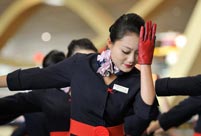The 109-year-old Australian Open Tennis Championships bow to a new queen. Li Na, the most popular tennis player in China, claimed her first Australian Open title and her second Grand Slam title on Saturday. After the game, Li rekindled the enthusiasm of the Chinese population, who applauded and congratulated this record-breaking Chinese tennis player.
In the meantime, Li's achievement has, once again, sparked a public debate about what made Li such a great tennis player. Public opinion, especially online comments, seems to have reached a one-sided consensus. It asserts that Li's success has entirely relied on her own hard work and courage in breaking free of the shackles of the State-run sports system, so that she manages her own sporting career.
A commentator who works for a local newspaper even said that Li winning the championship can serve as "a slap in the face of the outdated sports system."
Li's takeoff happened after she became a "freelance" tennis player. Her talent was brought forth when she became fully involved with the tennis tour and its competitions. It seems that her achievements in the tennis court and popularity commercially both result from her liberation from China's long-standing State-run sports system. The greater Li's performance, the more convincingly such a system should fall.
One must know that China's State-run sports system, though in some way inefficient compared with the market-oriented sports mechanism, is a specific outcome of the old age when China was a big but overlooked nation without any solid achievements in the global sporting arena. It was this system that made China's first performance at the 1984 Los Angeles Olympic Games come as a bombshell. Since then, for a long time, sports have been used as a useful tool to improve China's international image and boost China's soft power in the world.
It should also be noted that this system is also evolving with other facets of the country. When drawbacks emerge and the system doesn't fit the psychology of athletes of today, Chinese authorities are also trying to improve the system. In fact, the market-oriented approach is also what they resort to. Professional leagues of varieties of sports are being established, and popular sports are also being given more attention and funding than ever before.
However, considering the inertia produced by the decades-long system, a new market-oriented system will hardly be adopted at a stroke. The rusty but dogged mechanism can only be replaced by the new one step by step. Li Na will be woefully manipulated as a tool by public opinion to deride a system that did serve China well in the past. On the contrary, what Li should bring to the public is the confidence to speed up reform.
 A 60-hour journey home
A 60-hour journey home Int'l Snow Sculpture Art Expo
Int'l Snow Sculpture Art Expo Highlights of China's air force
Highlights of China's air force Airline crew stage flashmob dance at Kunming airport
Airline crew stage flashmob dance at Kunming airport Top15 countries to retire to in 2014
Top15 countries to retire to in 2014 Hot supermodel's new photo album released
Hot supermodel's new photo album released Asia's heaviest box girder finishes 'rotation' in Wuhan
Asia's heaviest box girder finishes 'rotation' in Wuhan Completed facade of People's Daily new headquarters
Completed facade of People's Daily new headquarters Chinese-branded car passes North America standard safety test for the first time
Chinese-branded car passes North America standard safety test for the first time Li Na beats Bouchard to reach Australian final
Li Na beats Bouchard to reach Australian final  Explore the sources of PM 2.5
Explore the sources of PM 2.5 Highlights of Chinese airborne troops'exercises
Highlights of Chinese airborne troops'exercises  'Living in ice house' competition held in central China
'Living in ice house' competition held in central China  Chinese figure in Oscar nominations
Chinese figure in Oscar nominations  Top ten aerospace events in China 2013
Top ten aerospace events in China 2013Day|Week|Month